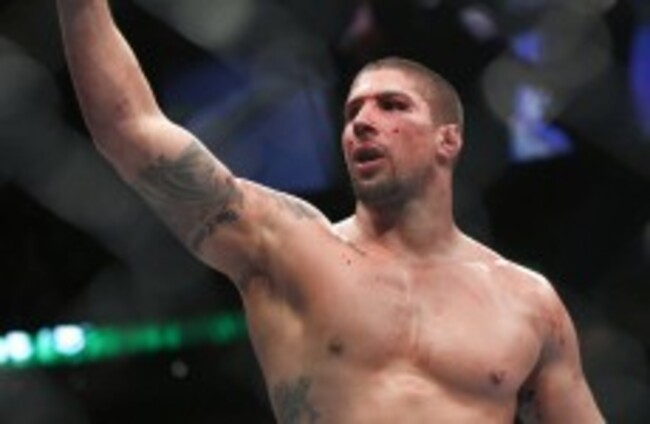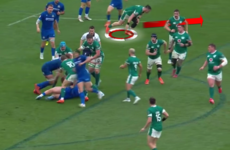AFTER HIS TKO loss to Travis Browne at UFC 181 last Saturday, commentator Joe Rogan issued Brendan Schaub with a stark warning.
Speaking on the Fighter and the Kid podcast, which is co-hosted by Schaub and actor Brian Callan, Rogan informed the 31-year-old heavyweight that he was unlikely to ever become an elite mixed martial artist.
The atmosphere, quite understandably, became thick with tension. However, Rogan’s comments were not meant as a slight. The defeat at the hands of Browne was the fifth of Schaub’s career – four of which have come via KO or TKO.
Rogan was expressing genuine concern for Schaub and the possibility that, if he were to continue fighting, he could incur serious brain damage.
For Rogan — an avid fan of all combat sports — to say such a thing would not have been easy, particularly when considering it was in a public forum and that the two are good friends.
Fighters know the risks they’re taking when pursuing a career in MMA. The problem is, when the sport is their only source of income they can too easily accept or flat-out ignore them. The need for financial security, as well as pride, compels many to continue fighting well beyond what is advisable.
The examples are manifold – former light-heavyweight champion Chuck Liddell, Shogun Rua, Minotauro Nogueira and Gray Maynard. All but Liddell are still competing.
During the discussion, Rogan referred to some of the UFC’s premier heavyweights, including Junior Dos Santos who fights Stipe Miocic at UFC on Fox Fight Night this Saturday.
Previously the heavyweight champion, Dos Santos has had only three career losses, one of which came via TKO. And as his record suggests, the Brazilian is one of the world’s best.
Which is probably why Rogan related no trepidation regarding his health. A cursory glance over Dos Santos’ resume could serve as confirmation that, to date, he’s unlikely to have suffered any lasting damage. Yet, a crude list containing a fighter’s win-to-loss ratio, rarely tells the full story.
During their gripping trilogy, current heavyweight champion Cain Velasquez bested Dos Santos on two occasions. When they first met, at UFC on Fox 1, Dos Santos knocked out Velasquez in 67 seconds.
In the highly-anticipated re-match at UFC 155, Velasquez took back his title back by subjecting Dos Santos to a relentless beating for a full five rounds. In the aftermath, Dos Santos’ face was swollen beyond recognition.
According to fightmetric.com, Velasquez landed 210 of the 339 strikes he threw at Dos Santos. Of those, 111 were deemed significant. The distribution of significant strikes indicate that Dos Santos absorbed 82 to the head, 25 to the body and four to the legs. Oddly, Velasquez only managed to knock him down once.
To be clear, UFC heavyweights tend to weigh in from 230-265lbs (16.5-18.9st). Furthermore, the gloves worn in MMA weigh 4oz, compared to the 12-16oz models used in boxing. That Dos Santos did not wilt during the ordeal is simply incredible.
Though, there are other considerations. Firstly, Velasquez, despite the frequency with which he hit Dos Santos, was unable to land a decisive knockout blow. Also, referee Herb Dean was never under the impression that Dos Santos was not defending himself intelligently. But most importantly, and perhaps worryingly, Dos Santos’ corner were never convinced to throw in the towel.
Yes, there was a world title and huge amounts of money at stake, but surely their man’s health should have taken precedence. Dos Santos would probably not have thanked them for doing so but making such difficult calls is a coach’s prerogative. Speaking at the post-fight press conference, Dana White aptly observed that some fighters are just too tough for their own good.
Dos Santos was then matched with arguably the hardest puncher in the entire sport, Mark Hunt. In the depths of the third round, he knocked out Hunt with a spectacular spinning-wheel kick. It was another battle and although the numbers are not particularly grim, Dos Santos still took 20 significant strikes to the head. The victory earned him another crack at Velasquez.
After their second fight, Dos Santos revealed that he had developed rhabdomyolysis – a condition which sees contents from the breakdown of muscle fibres enter the bloodstream – due to over-training. In the build-up to the third, he claimed to be fully healthy and that the outcome would be similar to the first. He was sorely mistaken.
On 19 October 2013 at UFC 166, Herb Dean stopped the fight at 3:09 of the fifth round. Once more, Velasquez viciously demolished Dos Santos en route to earning a TKO victory. Velasquez threw a total of 378 strikes and found his target 274 times. In all, 123 were significant — 96 to the head, seven to the body and 20 to the legs.
It hardly seemed plausible but Dos Santos’ face was even more distorted on this occasion. The question begs, how much is enough?
Dos Santos will fight for the first time since then when he meets Miocic. He still fully believes himself to be the best heavyweight in the world and would face Velasquez again in a heartbeat.
There is a fine line between courage and delusion — he may have crossed it — but he’s still a valuable commodity and capable of defeating most men in his weight-class.
Ultimately, it’s up to the fighter to decide for just how long he or she chooses to compete. However, the tunnel vision which makes them such indefatigable competitors may obscure the hard truth that only diminishing returns lay ahead.
For their part, the UFC uphold a strict policy when it comes to fighter welfare. MMA is still in its infancy and the long-term effects of such competition are yet to emerge. Yet boxing, along with recent revelations in ice-hockey and American football, provides a tangible reference point.
To avoid going down the same road, it is now imperative that an independent body be established so the sport can be objectively policed.












I don’t get the point of this article,you seem to be hinting that the UFC and its officials let fighters take unnecessary punishment when actually this couldn’t be further from the truth. The UFC’s record when it comes to fighter safety is second to none. The use of the smaller 4oz gloves actually stops fighters from taking prolonged and sustained punishment as the lighter gloves means a fighter will more than likely be knocked out if he is caught by a hard,clean shot unlike boxing where the more padded and heavier gloves mean a fighter can take needless punishment for a longer period which in turn results in brain trauma(this is also the reason why head guards have been removed in amateur boxing). There is also a lot more to MMA than just striking,these are people who train in several different disciplines like jui-jitsu,wrestling,judo,sambo etc so to just summarise a UFC fight by strikes seriously under values these athletes. UFC comes under the same jurisdiction as boxing and as many of its fights happen in Las Vegas it comes under the control of the Nevada State Boxing Commision,who just happen to give licenses to thousands of boxing fights every year,so are you to say that this Commision can police and monitor boxing but when it comes to MMA it isn’t doing its job. You are obviously not a UFC/MMA fan because you havn’t got a clue about the sport judging by this article,and if you want to see a truly one sided demolition watch Dos Santos vs Carwin.
Firstly, I was in no way trying to limit MMA purely to striking. But the grappling arts you mentioned, those focused on submissions and takedowns, have little relevance in terms of head injury. I am also aware of the role of the Nevada State Athletic commission and the UFC’s adherence to fighter safety, which I mentioned. But Rogan’s comments to Schaub made me consider other fighters, namely Dos Santos, who have sustained huge amounts of blows to the head and continue to fight, and whether or not a different type of body, unlike any seen in boxing, may be established to prevent some what’s happened to boxer’s over the years. Physicians with no bureaucratic connection to the sport’s hierarchies-something unique. I am also very aware of the merits of the smaller gloves, the practicalities of which have much to with the grappling you feel I’ve forgotten. I was simply comparing the difference in impact for punches in the two sports, particularly for people without your obvious expertise. I was at the JDS/ Carwin fight in Vancouver, working as an MMA journalist. But then again, I haven’t a clue.
Stick it to him tom!!!
What time on Video does Rogan make comments?
It’s not really at any one point. They kind of start talking about the fight around 11 minutes in and Rogan slowly starts to make the awkward points, the vast majority of the podcast is pretty awkward and uncomfortable.
15.25 the conversation starts